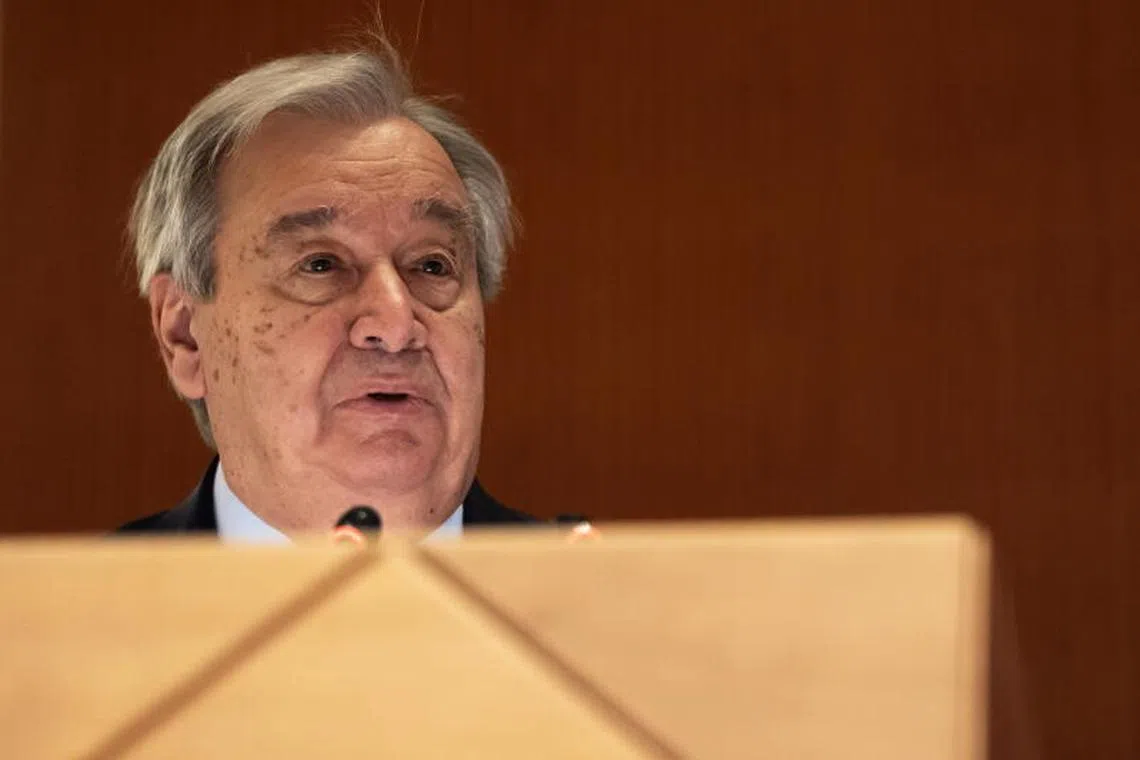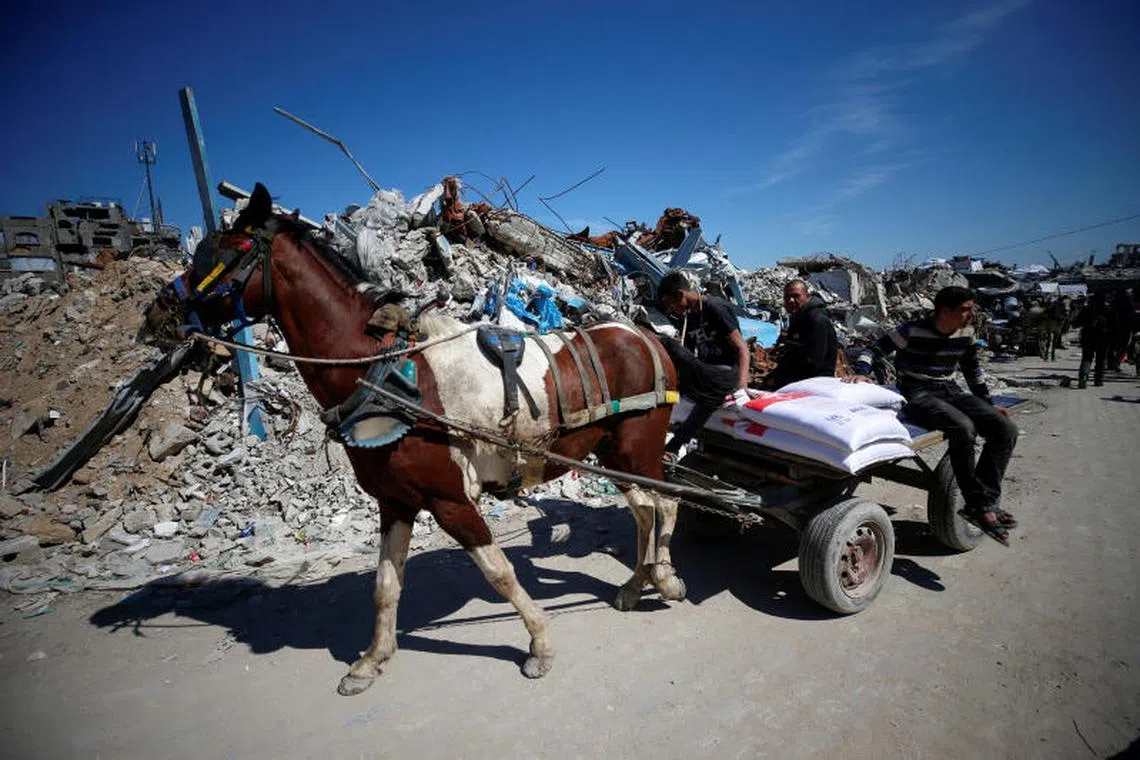UN urges Israel to restore Gaza aid as Hamas warns of ‘blatant coup’ against truce
Sign up now: Get ST's newsletters delivered to your inbox

UN Secretary-General Antonio Guterres called for “humanitarian aid to flow back into Gaza immediately”.
PHOTO: EPA-EFE
Follow topic:
JERUSALEM - The United Nations on March 2 called on Israel to immediately allow aid into Gaza, hours after Israel suspended humanitarian deliveries
With uncertainty looming over the truce, both Israel and Palestinian sources reported Israeli military strikes in the Gaza Strip, which the Health Ministry in the Hamas-run territory said killed at least four people.
The 42-day first phase of the ceasefire has drawn to a close, and early on March 2, Israel announced a truce extension until mid-April that it said US Middle East envoy Steve Witkoff had proposed.
Hamas has repeatedly rejected an extension, instead favouring a transition to the truce deal’s second phase that could bring a permanent end to the war.
The Palestinian group, whose Oct 7, 2023, attack on Israel
In a statement posted online, UN chief Antonio Guterres called for “humanitarian aid to flow back into Gaza immediately”, urging “all parties to make every effort to prevent a return to hostilities” and militants to release “all hostages”.
Mr Thomas Fletcher, head of the UN humanitarian agency Ocha, said in a post on social media platform X that “Israel’s decision to halt aid into Gaza is alarming” and may be in violation of international law.
Following the announcement of the aid suspension, AFP images showed trucks loaded with goods lined up on the Egyptian side of the Rafah crossing.
Umm Mohammad Abu Laia, a resident of Rafah on Gaza’s southern border, said: “Since the morning, we haven’t seen any trucks entering.”
She warned of a “crisis” as the prices of basic commodities surged “as soon as the merchants heard about the closing of the crossing”.
The first phase of the truce, which took effect on Jan 19, saw an increase in aid into Gaza, where the war has destroyed or damaged most buildings, displaced almost the entire population and triggered widespread hunger, according to the UN.
Israeli Foreign Minister Gideon Saar, asked by reporters about the risk of starvation, dismissed such warnings as “a lie”.

Palestinians transporting aid on a horse-drawn cart, after Israel said it had ceased entry of humanitarian aid into Gaza, on March 2.
PHOTO: REUTERS
A ‘forever’ truce
Israeli Prime Minister Benjamin Netanyahu’s office said he had “decided that, from this morning, all entry of goods and supplies into the Gaza Strip will be suspended”.
It said there would be “consequences” for Hamas if it did not accept the temporary truce extension
On a sandy street in Gaza City, Ms Mays Abu Amer, 21, expressed hope that the ceasefire could continue “forever”.
“We have so much destruction; we need a lot of time for reconstruction,” she said.
Mediator Egypt and the International Committee of the Red Cross have appealed for the truce to be maintained.
Militant group Islamic Jihad, a Hamas ally, accused Israel of “sabotaging” the ceasefire.
According to Israel, the truce extension would see half of the hostages still in Gaza freed on the day the deal comes into effect, with the rest to be released at the end if an agreement was reached on a permanent ceasefire.
Of the 251 captives taken during Hamas’ October 2023 attack, 58 remain in Gaza, including 34 the Israeli military has confirmed are dead.
‘Return all of them’
In Israel, mourners who turned out to farewell Shlomo Mansour, 85, whose body militants had held in Gaza and returned to Israel on Feb 27, said more should be done to get the remaining captives home.
“Return all of them immediately,” said Mr Vardit Roiter.
Under the first phase of the truce, Gaza militants handed over 25 living hostages and eight bodies, including Mr Mansour’s, in exchange for the release of about 1,800 Palestinian prisoners.
Israelis in Jerusalem welcomed the decision to block aid, describing it as a way to pressure Hamas into making concessions.
Mr Neria, a 27-year-old teacher who gave only his first name, told AFP it was a “smart move” that could “push forward new things, the release of more hostages and the end of the war”.
In southern Gaza on March 2, the civil defence agency reported shelling and gunfire “from Israeli tanks”, which the army said it was “unaware of”.
The Palestine Red Crescent Society said Israeli drone strikes killed one person in the same area and another in a nearby town.
The military said it had conducted an air strike in northern Gaza targeting suspects it said had “planted an explosive device” near its troops.
Including the deaths on March 2, Gaza’s Health Ministry has recorded 116 people killed by Israel’s military since the ceasefire took effect on Jan 19, substantially reducing violence.
The 2023 attack that sparked the war resulted in the deaths of more than 1,200 people in Israel, mostly civilians, while Israel’s retaliation in Gaza has killed more than 48,300 people, also mostly civilians, data from both sides shows. AFP

